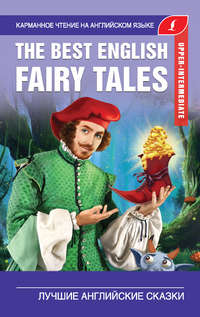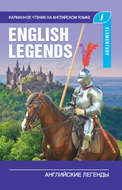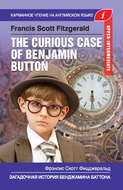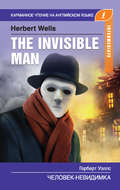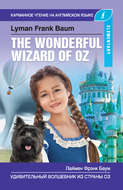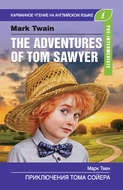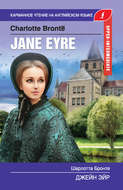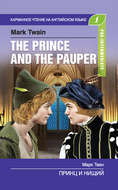Buch lesen: "The Best English Fairy Tales / Лучшие английские сказки"
Адаптация текста, комментарии и словарь Д. Положенцевой
© ООО «Издательство АСТ», 2019
The Ugly Duckling1
H.C. Andersen
It was so beautiful in the country, it was summer. The fields were golden and the grass was green. There were thick forests and a lot of lakes. Yes, it was indeed lovely out there in the country.
There stood an old house with a pond around it. A duck sat on her nest. She was hatching her ducklings. She was bored. The other ducks swam in the pond and no one came to see her.
But at last the eggs began to crack, one after another.
“Peep, peep!” said the little ducklings.
“Quack, quack!” said the duck. Quick as quick can be they all went out to look at the green world. Their mother let them look, because green is good for the eyes.
“How big the world is,” said all the young ducks.
“Do you think this is the whole world?” their mother asked. “No, it is bigger, to the other side of the garden and right on into the field. I hope you are all hatched2,” she said and she got up. “No, not quite all. The biggest egg still lies here. How much longer is this going to take? I am really tired of it all,” she said. She sat back on her nest.
“Well, how does it go?” asked an old duck. She came to visit her friend.
“It takes a long time with this egg,” said the duck on the nest. “It won’t crack, but look at the others. They are cute little ducklings!”
“Let’s have a look at the egg that won’t crack,” the old duck said. “It’s a turkey egg, and you can take my word for it.3 What trouble I had with those turkey children. They are afraid of the water. Let me see the egg… Yes, it’s a turkey egg. Let it lie, and go teach your ducklings to swim.”
“Oh, I’ll sit a little longer.”
“As you wish,” said the old duck, and she went away.
Finally the big egg cracked.
“Peep,” said the young one. But he was so big and ugly.
The duck looked at him.
“That’s a very big duckling,” she said. “He doesn’t look like the others. Can he really be a turkey baby? Well, well! We will see.”
Next day the weather was nice. The mother duck led her whole family down to the pond. Splash! she went to the water.
“Quack, quack,” said she, and one duckling after another jumped in. They were all in the water. Even the big, ugly gray duckling was swimming along.
“Hm, that’s no turkey,” she said. “See how nicely he swims. He’s my son after all. He’s nice. Quack, quack, come with me. Let’s go to the duck yard. But keep close to me. And watch out for the cat!”
It was very loud in the duck yard. Two families were fighting over the head of a fish. But the cat got it.
“You see, this is the world. Can you see that old duck over there? She’s the noblest of us all. That’s why she’s so fat. Don’t turn your toes in. A duckling turns his toes way out4, just as his father and mother do. Now say quack!”
They did as she told them. But the other ducks around them looked on and said, “Look! What an ugly duckling he is!” One duck came up to him and bit his neck.
“Let him alone,” his mother cried.
“But he’s too big and strange,” said the duck.
“What nice children you have, Mother,” said the fattest duck. “They are all pretty. But this one is not. It’s a pity you can’t hatch him again5.”

“Your ladyship,” said the mother. “He isn’t so pretty, but he’s a good duckling. He swims very well, even a little better than my other children do. It took too long for me to hatch him. That’s why he’s so big.”
“The other ducklings are pretty,” said the old duck. “If you find a fish’s head, you may bring it to me.”
The poor duckling was very unhappy. Why was he so ugly? He was pushed about and made fun of by the ducks, and the chickens as well.
“He’s too big and ugly,” said they all.
Even his own brothers and sisters made fun of him.
“Oh,” they would always say, “we wish the cat would catch you, you ugly duckling.”
And his mother said, “I wish you were away.”
Even the girl who fed them kicked him with her foot.
So he ran away and flew over the fence. “That’s because I’m so ugly,” he thought. He ran on until he reached the great marsh. There wild ducks lived. He lay under the bush there all night long.
When morning came, the wild ducks flew up to have a look at their new companion.
“What are you? You are so ugly! Go away,” they told him.
Poor duckling! All he wanted was to lie here and drink a little water from the marsh.
There he stayed for two days. Then he met two wild geese.
“Listen,” they said, “you’re so ugly that we feel sorry for you. Come with us. There are some wild geese in the marsh.”
Bing! Bang! Shots rang in the air, and these two geese fell dead. Bing! Bang! the shots rang. The hunters lay all around the marsh, and some even were on the branches of trees.6
The bird dogs came splash, splash! through the marsh. The poor duckling was very frightened that he wanted to hide his head under his wing. But at that very moment he saw a big dog right in front of him. It was very big with his long tongue, sharp teeth and wicked eyes. He opened his mouth, his teeth flashed, and – splash, splash – on he went. He didn’t touch the duckling.
“Thank heavens,” the duckling said, “I’m so ugly that the dog won’t even bite me.”
He lay still and shot after shot was fired. It was late in the day when it became quiet again. The poor duckling was afraid to move. He waited. Then he got up and ran as fast as he could. He ran across the fields and marshes.
Late in the evening he came to a little house. The wind was so strong and the poor little duckling was so weak. He noticed a crack in the door and squeezed into the room.
Here lived an old woman with her cat and her hen. The cat called Sonny could purr, and even make sparks, for that you had to stroke his fur the wrong way. The hen had short little legs, so she was called Chickey Shortleg. She laid good eggs, and the old woman loved her.
In the morning they saw the duckling.
“Oh, it’s a duck!” The old woman had bad eyes, and she thought the duckling was a fat duck. “It’s good,” she said. “Now I shall have duck eggs.”
So the duckling was there for three weeks, but he didn’t lay any eggs.
In this house the cat was master and the hen was mistress. They always said, “We and the world,” they thought they were half of the world. The duckling thought that they were wrong, but the hen didn’t want to hear about it.
“Can you lay eggs?” she asked.
“No.”
“Then be nice and do what we say.”
The cat asked, “Can you purr or make sparks?”
“No.”
“Then keep your opinion to yourself.”
The duckling sat in a corner, feeling sad. Then he remembered the fresh air and the sunlight. He wanted to go outside and swim in the pond. He told the hen about it.
“What a silly thing to say!” the hen cried. “Lay an egg or learn to purr.”
“But I’d like to swim… It’s so nice in the water,” said the duckling.
“You’re crazy!” said the hen.
So the duckling went away. He swam on the water and dived down in it. But he still was very ugly for all the other animals.
Autumn came on. The leaves in the forest were yellow and brown. It was getting very cold. Pity the poor little duckling!
One evening, the duckling saw very beautiful birds in the sky. They were white, with long thin necks. They were swans, flying away from this cold land, away to warmer countries. The ugly little duckling watched them. He went around and round in the water. Oh! He could not forget those happy birds. He did not know what birds they were but he loved them.
The winter grew colder. The duckling had to swim in the water to keep the pond from freezing over. But the hole in which he swam was getting smaller and smaller. One day he was so cold and tired that he got frozen fast in the ice.
Early that morning a farmer came by, and he saw the duckling in the pond. He broke the ice with his wooden shoe and carried the duckling home to his wife. After some time the duckling felt better. When the children wished to play with him, he fell down into the milk bowl then he flew into the butter bowl. Imagine what he looked like now! The children tried to catch him, they laughed and they shouted. Luckily the door was open, and the duckling escaped through it into the bushes.
The winter was very cruel to the little duckling. But the weather started changing, the duckling was still alive. The birds began to sing again. It was beautiful springtime.
One day the duckling understood that his wings were strong. He could fly! Before he knew what was happening, he was high in the sky. Then he saw a great garden with apple trees. There were beautiful sweet flowers. Oh, it was wonderful here!
Then the duckling saw three lovely white swans. They swam slowly in the river. The duckling remembered these noble birds. He became very sad.
“I can’t fly near these noble birds, they will peck me because I am so very ugly. But I don’t care. Better be killed by them than to be pecked by the ducks, hens, kicked by the hen-yard girl, or to be frozen in winter.”
So he flew into the water and swam to the beautiful swans. They saw him.
“Kill me!” cried the poor duckling, and he bowed his head down over the water. But what did he see there, mirrored in the clear river? It was no longer a dirty, gray duckling. He was a swan!
He felt happy because now he knew who he was. He was born in the duck’s yard but from a swan’s egg. The great swans swam all around him and stroked him with their wings.
Some little children came into the garden. The smallest child cried, “Here’s a new one,” and the others said, “yes, a new swan has come.” They clapped their hands, danced around, and ran to their father and mother.
They threw bread and cake upon the water, and they all said, “The new one is the most beautiful of all. He’s so young and so lovely” The old swans bowed.
Then he felt very shy and hid his head under his wing. He did not know what this was all about. He felt so very happy, but he wasn’t at all proud. A good heart never grows proud. He thought about how unhappy he was when he was a duckling. And now they all called him the most beautiful of all beautiful birds. The sun was so warm. He held his neck high and he cried out loudly: “I never dreamed I could be so happy, when I was the ugly duckling7!”
The Well of the World’S End8
Once upon a time, there was a girl whose mother had died, and her father married again. Her stepmother hated her because she was more beautiful than herself, and she was very cruel to her. She used to make her do all the servant’s work. At last, one day, the stepmother thought to get rid of her9. So she gave her a sieve and said to her: “Go, fill it at the Well of the World’s End and bring it home to me full.”
She thought the girl would not find the Well of the World’ s End. And if she did, how could she bring home a sieve full of water?
Well, the girl started her journey. She asked everyone she met to tell her where the Well of the World’s End was. But nobody knew, and she didn’t know what to do. One day a little old woman told her where it was. Finally she reached the Well of the World’s End. But when she dipped the sieve in the cold, cold water, it all ran out again. She tried and tried again. She sat down and cried as if her heart could break.
Suddenly she heard a croaking voice, and she looked up. She saw a great frog with large eyes looking at her and speaking to her.
“What’s the matter, girl?” it said.
“Oh, dear, oh dear,” she said, “my stepmother has sent me all this long way to fill this sieve with water from the Well of the World’s End, and I can’t fill it.”
“Well,” said the frog, “do whatever I ask you for a whole night long, I’ll tell you how to fill it.”
So the girl agreed, and the frog said:
“Stop it with moss and put some clay, And then it will carry the water away”; and then it jumped into the Well of the World’s End.

So the girl found some moss, and she put some clay. Then she dipped it once again into the Well of the World’s End. This time, the water didn’t run out, and she turned to go away.
Just then the frog popped up its head out of the Well of the World’s End, and said: “Remember your promise.”
“All right,” said the girl, “What can a frog do to me?”
So she went back to her stepmother, and brought the sieve full of water from the Well of the World’s End. The stepmother was angry, but she said nothing at all.
That very evening they heard something tap-tapping at the door low down, and a voice cried out:
“Open the door,
my heart,
Open the door,
my darling;
Mind you the words
that you and I spoke,
Down in the meadow,
at the World’s End Well.”
“What is it?” cried out the stepmother, and the girl told her everything, and what she had promised the frog.
“Girls must keep their promises10,” said the stepmother. “Go and open the door!” She was glad the girl would serve a nasty frog.
So the girl went and opened the door, and there was the frog from the Well of the World’s End. And it jumped and reached the girl, and then it said:
“Lift me to your knee,
my heart;
Lift me to your knee,
my darling;
Remember the words
you and I spoke,
By the World’s
End Well.”
But the girl didn’t like to do it. Her stepmother said: “Lift it up! Girls must keep their promises!”
So finally she lifted the frog up on to her lap, and it lay there for a time. At last it said:
“Give me some supper,
my heart,
Give me some supper,
my darling;
Remember the words
you and I spoke,
By the Well
of the World’s End.”
Well, she didn’t mind doing that, so she got it a bowl of milk and bread. She fed the frog well. And when the frog finished, it said:
“Go with me to bed,
my heart,
Go with me to bed,
my darling;
Mind you the words
you spoke to me,
Down by the cold well,
so weary.”
But that the girl didn’t want to do that. But her stepmother said: “Do what you promised, girl! Girls must keep their promises.”
So the girl took the frog with her to bed, and kept it as far away from her as she could. In the morning, the frog said:
“Chop off my head,
my heart,
Chop off my head,
my darling;
Remember the promise
you made to me,
Down by the cold well,
so weary.”
At first the girl wouldn’t do that. She felt sorry for the frog. It helped her at the Well of the World’s End and was not a bad frog at all. But when the frog said the words over again she went and took an axe and chopped off its head, and oh! there stood before her a young prince. He told her his story. He had been enchanted by a wicked magician, and he could never be unspelled till some girl would do what he asked for a whole night, and chop off his head at the end of it.
The stepmother was surprised when she found the young prince instead of the ugly frog. And she wasn’t best pleased, when the prince told her that he was going to marry her stepdaughter. They got married, went to live in the castle of the king, his father.
The Fish and the Ring
Once upon a time, there was a mighty Baron in the North Country who was a great magician and knew everything that would come to pass11. So one day, when his little boy was four years old, he looked into the Book of Fate12 to see what would happen to him. And to his dismay, he found that his son would wed a lowly maid13 that had just been born in a small house. Now the Baron knew the father of the little girl was very, very poor, and he had five children already. So he called for his horse and rode to the father’s house and saw him sitting by the door, sad and doleful. So he dismounted and went up to him and said, “What is the matter, my good man?” And the man said, “Well, your honour14, the fact is, I have five children already, and now the sixth one comes, a little girl, and where to get the bread from to fill their mouths, that’s more than I can say.”
“Don’t cry, my dear man,” said the Baron. “If that’s your trouble, I can help you. I’ll take away the last little one, and you won’t have to bother about her.”
“Thank you kindly, sir,” said the man, and he went in and brought out the little girl and gave her to the Baron, who mounted his horse and rode away with her. And when he got by the bank of the river, he threw the little girl into the river and rode off to his castle.
But the little girl didn’t sink; her clothes kept her up for a time15, and she floated, and she floated, till she was cast ashore just in front of a fisherman’s hut. There the fisherman found her, and took pity on the poor little girl and took her into his house, and she lived there till she was fifteen years old. So she became a fine handsome girl.
One day, it happened that the Baron went out hunting16 with some companions along the banks of the river and stopped at the fisherman’s hut to get a drink, and the girl came out to give it to them. They all noticed her beauty, and one of them said to the Baron, “You can read fates, Baron, whom will she marry, how do you think?”
“Oh! that’s easy to guess,” said the Baron; “some farmer or other. But I’ll cast her horoscope. Come here, girl, and tell me on what day you were born.”
“I don’t know, sir,” said the girl, “I was picked up just here. The river brought me down17 about fifteen years ago.”
Then the Baron knew who she was, and when they went away, he rode back and said to the girl, “Listen to me, girl, I will make your fortune. Take this letter to my brother, and you will be settled for life.” And the girl took the letter and said she would go. Now this is what he had written in the letter:
“Dear brother,
Take the bearer and put her to death immediately.”
So soon after, the girl left and slept for the night at a little inn. Now that very night18 a band of robbers broke into the inn and searched the girl, who had no money and only the letter. So they opened this and read it. The captain of the robbers took a pen and paper and wrote this letter:
“Dear brother,
Take the bearer and marry her to my son immediately.”
And then he gave it to the girl. So she went on to the Baron’s brother, a noble knight, with whom the Baron’s son was staying. When she gave the letter to his brother, he gave orders for the wedding to be prepared at once, and they were married that very day19.
Soon after, the Baron himself came to his brother’s castle, and what was his surprise! But he took the girl out for a walk, as he said, along the cliffs. And when he got her all alone, he took her by the arms and was going to throw her over. But she begged hard for her life20. “I have not done anything,” she said, “please do not kill me; I will do whatever you wish. I will never see you or your son again till you desire it.” Then the Baron took off his gold ring and threw it into the sea, saying, “Never let me see your face till you can show me that ring”, and he let her go21.
When the guests saw such a young and beautiful cook, they were surprised. But the Baron was very angry. So the girl went up to him with her hand before her with the ring on it, and she put it down before him on the table. Then at last, the Baron saw that no one could fight against Fate, and he handed her to a seat and announced to all the company that this was his son’s true wife. And he took her and his son home to his castle, and they all lived happy.
Tom Thumb 22
Grimm Brothers
One night a poor woodman sat in his cottage, his wife sat by his side spinning.
“How lonely it is, wife,” said he, “for you and me to sit here by ourselves, without any children to play about. Other people seem so happy with their children!”
“Agree,” said the wife, “how happy would I be if I had one child! If it were no bigger than my thumb, I would love it!”
Not long afterwards her dream came true. She had a little boy, who was healthy and strong. But he was not much bigger than her thumb. So she said, “Well, now we have got what we wished for, and, little as he is, we will love him!” And they called him Thomas Thumb.
The husband and his wife fed him well, but he never grew bigger. His eyes were smart and he was a clever little fellow.
One day, as the woodman was getting ready to go into the wood to cut fuel, he said,
“I wish I had someone to bring the cart after me.”
“Oh, father,” cried Tom, “I will take care of that; the cart will be in the wood by the time you want it.”
The woodman laughed, and said,
“How can that be? You can’t reach up to the horse.”
“Never mind that, father,” said Tom, “I will get into his ear and tell him which way to go.”
“Well,” said the father, “we will try then.”
His mother put Tom into the horse’s ear. The little man told the horse how to go, crying out, “Go on!” and “Stop!”. The horse went on just as well as if the woodman had driven it himself into the wood23. The horse was going a little too fast, and Tom was calling out, “Gently! gently!” when two strangers came up.
“Strange”!’ said one: “there is a cart going along, and I hear someone talking to the horse, but I can see no one.”
“Strange, indeed,” said the other; “let us follow the cart, and see where it goes.”
So they went on into the wood and came to the place where the woodman was.
Then Tom Thumb, seeing his father, cried out, “See, father, here I am with the cart, all right and safe!”
The two strangers did not know what to say. At last one said,
“That little boy will make us rich if we get him, and carry him about from town to town as a show. We must buy him!” So they went up to the woodman, and asked him what he would take for the little man.
“I won’t sell him at all,” said the father, “my own flesh and blood is dearer to me than all the silver and gold in the world.”
But Tom had a plan. He jumped to his father’s shoulder and whispered in his ear,
“Take the money, father, and let them have me. I’ll soon come back to you.”
At last the woodman said he would sell Tom to the strangers for a large piece of gold, and they paid the price.
“Where would you like to sit?” asked one of the strangers.
‘Oh, put me on your hat. I can walk about there and see the country as we go along.”
So they did as he wished.
They started their journey. When it was getting dark, then the little man said, “Let me get down, I’m tired.”
So the man took off his hat, and put him down. But Tom ran to an old mouse-hole and hid himself.
“Good night, my masters!” said he, “I’m off24! Look better after me the next time.”
The strangers tried to get him out of the mouse-hole, but they couldn’t. Tom only crawled farther and farther in. And at last it became quite dark, so that they went their way without their prize.
When Tom found they were gone, he came out of his hiding place.
“What dangerous walking it is,” said he.
At last he found a large empty snail-shell.
“This is lucky,” said he, “I can sleep here very well.”
Just as he was falling asleep, he heard two men talking to each other. And one said to the other, “How can we rob that rich man’s house?”
“I’ll tell you!” cried Tom.
“What is it?” said the thief, frightened, “I’m sure I heard someone speaking.”
They stood still listening, and Tom said,
“Take me with you, and I’ll show you how to get the money.”
“But where are you?” asked they.
“Look about on the ground,” answered he.
At last the thieves found him out, and lifted him up in their hands.
“You’re so small!” they said, “what can you do for us?”
“I can get into the house, and throw you out whatever you want.”
“Hm,” said the thieves; “yes, you can help us, come along.”
When they came to the rich man’s house, Tom slipped through the window-bars into the room. And then he cried loudly, “Will you have all that is here?”
The thieves were frightened, because Tom was very loud. He said, “Quiet! They may wake up!” But Tom cried out again,
“How much will you have? Shall I throw it all out?”
The cook woke up in the next room and listened. The thieves were frightened, but they said, “Stop making jokes, throw us out some money.”
Then Tom cried out as loud as he could, “Very well! Hold your hands! Here it comes.”
The cook heard it, so she jumped out of bed, and ran to open the door. The thieves ran off as if a wolf was at their tails. The cook found nothing, and she went to bed. She thought she had a dream with her eyes open.
The little man found a nice place in the hay to finish his night’s rest. He wanted to have a good sleep and then find his way home to his father and mother.
The cook woke up early to feed the cows and took a large bundle of hay25, with the little man in the middle of it. He still slept on, and woke up only when he was in the mouth of the cow.
“It is very dark,” said he; “they forgot to build windows in this room to let the sun in.”
He was already in the cow’s stomach, and more and more hay was always coming down. And he didn’t have enough space, it became smaller and smaller. At last he cried out as loud as he could, “Don’t bring me any more hay! Don’t bring me any more hay!”
The cook heard someone speak. She was sure it was the same voice that she had heard in the night. She was so frightened that she ran off as fast as she could to her master, and said,
“Sir, sir, the cow is talking!”
But the master said, “Woman, you’re mad!”
However, he went with her into the cow-house, to see what was the matter.
At the moment they came in, Tom cried out, “Don’t bring me any more hay!”
The master was very frightened. And thinking the cow went mad he told his man to kill her. So the cow was killed, and thrown out upon a dunghill.
Tom tried to get out from the cow’s stomach, but that at that moment a hungry wolf jumped out, and swallowed up the whole stomach, with Tom in it and ran away.
Tom cried out, “My good friend, I can show you where you can eat well.”
“Where’s that?” said the wolf.
“In the house of a woodman,” said Tom, describing his father’s house. “You can get into the kitchen and then into the pantry. There you will find cakes, ham, beef, cold chicken, pig, apple-dumplings26, and everything that your heart can wish.”
The wolf did not want to be asked twice27. So that very night he went to the house and got into the kitchen, and then into the pantry28. He ate and drank there a lot to the moment when he could not move.
This was just what Tom wanted. He began to cry and shout, making all the noise he could.
“Quiet!” said the wolf, “you’ll wake everybody up in the house.”
“What’s that to me?” said the little man; “you have eaten well, now I want be merry myself”; and he began, singing and shouting as loud as he could.
The woodman and his wife woke up and came closer to the pantry. They saw a wolf was there, and the woodman ran for his axe, and gave his wife a big knife.
“Stay behind,” said the woodman, “and when I have knocked him on the head you must rip him up with the knife.”
Tom heard all this, and cried out, “Father, father! I am here, the wolf has swallowed me.”
And his father said, “Heaven be praised! We have found our dear child again”. The woodman hit the wolf on the head, and killed him on the spot. They cut his body, and set Tom free.
“Ah!” said the father, “what fears we have had for you!29”
“Yes, father,” answered he, “I have travelled all over the world, I think, in one way or other, since we parted; and now I am very glad to come home and get fresh air again.”
“Why, where have you been?” said his father.
“I have been in a mouse-hole, and in a snail-shell, and down a cow’s stomach, and in the wolf’s belly. And now here I am again, safe and sound30.”
“Well,” said they, “You came back and we will not sell you again for all the riches in the world.”
Then they hugged and kissed their dear little son. They gave him a lot to eat and drink, because he was very hungry. So Master Thumb stayed at home with his father and mother. He was a traveler, and had done and seen so many fine things, and liked telling the whole story. He always agreed that, after all, there’s no place like HOME!
The Ugly Duckling – Гадкий утенок
[Закрыть]
I hope you are all hatched – Надеюсь, вы все вылупились.
[Закрыть]
take my word for it – помяни моё слово
[Закрыть]
A duckling turns his toes way out – Утенок должен выворачивать лапки наружу
[Закрыть]
It’s a pity you can’t hatch him again – Жаль, что его уже не переделать
[Закрыть]
Shots rang in the air, and these two geese fell dead – Раздались выстрелы, и два гуся упали замертво
[Закрыть]
I never dreamed I could be so happy, when I was the ugly duckling – О таком счастье я и не мечтал, когда был гадким утенком!
[Закрыть]
The Well of the World’s End – Колодец на краю света
[Закрыть]
the stepmother thought to get rid of her – мачеха задумала избавиться от нее.
[Закрыть]
Girls must keep their promises – Девочки должны сдерживать свои обещания
[Закрыть]
knew everything that would come to pass – знал всё, что произойдёт
[Закрыть]
the Book of Fate – Книга Судеб
[Закрыть]
a lowly maid – девушка из низшего сословия
[Закрыть]
your honour – ваша часть
[Закрыть]
kept her up for a time – держали её некоторое время на плаву
[Закрыть]
went out hunting – отправился на охоту
[Закрыть]
The river brought me down – Река вынесла меня
[Закрыть]
Now that very night – И как раз в ту самую ночь
[Закрыть]
that very day – в тот же день
[Закрыть]
she begged hard for her life – она молила пощадить её жизнь
[Закрыть]
and he let her go – и он отпустил её
[Закрыть]
Tom Thumb – Мальчик-с-пальчик
[Закрыть]
The horse went on just as well as if the woodman had driven it himself into the wood – Лошадь шла почти также хорошо, как если бы ею управлял сам дровосек.
[Закрыть]
I’m off – Я вне игры!
[Закрыть]
bundle of hay – вязанка сена
[Закрыть]
apple-dumplings – яблоки, запеченные в тесте
[Закрыть]
The wolf did not want to be asked twice – Волка не надо было просить дважды.
[Закрыть]
pantry – кладовая для продуктов
[Закрыть]
what fears we have had for you! – Мы так боялись за тебя
[Закрыть]
safe and sound – целый и невредимый
[Закрыть]
Die kostenlose Leseprobe ist beendet.
